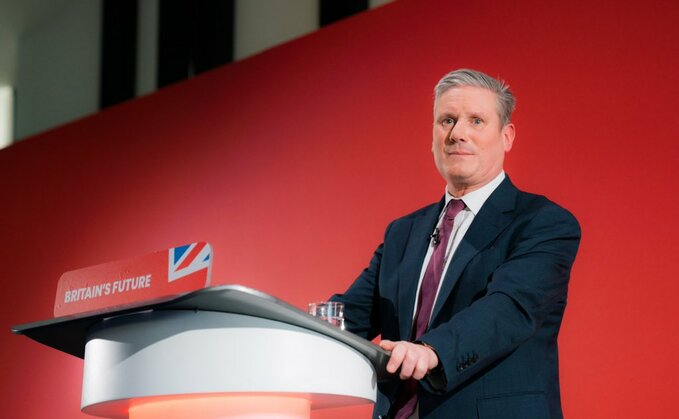
Credit: Labour
The UK economy is crying out for investment, and public spending has a critical catalysing role to play - if even Labour won't accept that fact, a slow recovery awaits
The saga of Labour's £28bn green investment plan looks set to reach its denouement this afternoon with the biggest blow to the Party's carefully constructed pro-business credentials since Jeremy Corbyn was invited to spend more time with his placards.
The comically drawn out decision to axe the totemic green investment goal may have sparked predictable howls of outrage from environmental campaigners, but it will also leave a lot of businesses very disappointed at the Labour leadership's willingness to dilute such a key plank in its economic recovery plans.
In recent weeks, business groups and high-profile corporate leaders have either implicitly or explicitly expressed their support for Labour's plans. The most influential lobby groups are understandably reluctant to endorse one political Party in an election year, but it is notable how in both the CBI and the British Chambers of Commerce have publicly called for whoever forms the next government to deliver a more ambitious net zero strategy and urgently find ways to mobilise increased levels of investment. Warnings over the deficit have been notable by their absence. Meanwhile, those notorious eco-warriors at the International Monetary Fund (IMF) called on the government to prioritise investment in the clean energy transition over unnecessary and counter productive tax cuts. Former Siemens UK boss Jürgen Maier spoke for many business leaders when he recently argued "the £28bn is not a cost, it's an investment", adding it should represent an "absolute minimum".
The business community is not a homogenous entity and there will inevitably be some investors who align with the Conservatives' belief the UK's deficit is so severe, borrowing to invest in critical infrastructure now represent a bigger threat to the country's economic stability than tax cuts funded through implausible future spending cuts. But one of the most surprising aspects of the lengthy attempt to weaponise Labour's £28bn has been the inability of the government and its outriders to find business leaders to condemn the green investment plan - because they will have been looking for them.
In contrast, Labour's decision to ditch its investment goal has left some business figures so angry they have today gone public with their frustrations. The UK Green Building Council, which represents a raft of leading construction and property firms, branded the move "a colossally short-sighted political manoeuvre". Christophe Williams at UK solar technology firm Naked Energy said the move was "bad for British business - domestic manufacturing for renewables has huge potential, now both UK government parties are missing the chance". Sebastian Peck, managing partner at KOMPAS VC, said the U-turn was "not just detrimental to the climate, it doesn't make financial sense either". Green campaign groups and think tanks are, if anything, angrier still. Recent polling suggests a sizeable majority of the public will be similarly unimpressed.
Keir Starmer and Rachel Reeves will today attempt defend the decision and present a unified front in explaining why the £28bn target had to go.
They will argue the fiscal trainwreck the current government will bequeath whoever forms the next administration, means Labour's spending plans will have to become more flexible and responsive. Money will have to be found to tackle spending cuts pencilled in by Chancellor Jeremy Hunt that would otherwise prove catastrophic for schools, courts, and prisons. The commitment to investing more in green infrastructure remains, but it is impossible to simply borrow the UK's way out of its productivity crisis when the disastrous Liz Truss experiment has provided painful recent evidence of why fiscal rules are so important.
Starmer will also stress that Labour remains fully committed to its mission to deliver a clean power system by 2030 and will argue that this can be achieved without a specific headline investment figure. The bulk of the green investment Labour planned was always meant to come from the private sector. Key policies such as a national efficiency programme, a new wealth fund, and planning reform will remain. Labour will claim these measures can serve to turbocharge private investment in green infrastructure without the need for a firm investment goal that was always in conflict with fiscal rules that had to take precedence.
It is a reasonable argument and is not actually that far removed from the line Labour has deployed for the months during which it has insisted the £28bn goal was an ambition that would still have to operate within fiscal constraints.
The problem is the position Labour is about to adopt is weaker politically, environmentally, and economically than the plan Starmer was publicly defending only two days ago.
The nasty surprise awaiting those within Labour who lobbied for the £28bn to be dropped is that axing the target will do nothing to neuter Tory attack lines over Labour profligacy. Ministers will now argue Labour still plans to spend the money, given it was previously seen as key to clean power targets that it intends to retain. It will simply become 'Labour's secret plan for green tax hikes'. Attacks will also focus on those parts of the strategy that do remain, such as the £6bn a year Warm Homes Fund, which was the subject of a government analysis yesterday alleging it could end up costing double that. Labour advisors are already locked into precisely the same position they were in over the £28bn target, insisting its energy efficiency plans won't really cost as much as the government says and will be subject to strict fiscal rules.
Worse still for Labour, the U-turn provides credence to the most effective government attack line: that Starmer doesn't stand for anything. It is an attack that stings, because it has more than a grain of truth to it. As former Labour advisor John McTernan has argued, Labour only wins when it stands for something. The £28bn commitment was the most visible emblem of Labour's attempt to associate itself with a new era-defining mission to build a green economy - and it has just been dropped. Labour has both diluted its most inspiring mission and diluted a key point of difference with the government. The playbook that traditionally wins elections for Labour combines economic credibility with a clear and ambitious vision to own the future. "The white heat of technology"; "Education, education, education"; "a new fiscal lock". Labour's pitch to voters just got weaker. That may not matter given the government's unpopularity, but it will matter if it needs a strong mandate for controversial reforms. It will matter again if it needs to call on its base to win a second term.
From an environmental perspective, whoever forms the next government will face a 60-month race to deliver ambitious emissions and nature protection goals that the current government is not on track to meet. The 68 per cent cut in emissions on 1990 levels required by the end of the decade relies on the turbocharging of renewables, electric vehicle, and heat pump deployment. All these industries will continue to prosper in the coming years, and they are likely to get a major boost if Labour does win and makes good on its promise to ram through planning and grid connection reforms that have been beyond a Conservative government reliant on NIMBY MPs.
But there are key pillars of the UK's decarbonisation programme where market failures and competition from US and EU subsidy programmes mean Labour will struggle to mobilise sufficient capital without public investment. This is why the £28bn was deemed essential in the first place. The current government has myriad funding pots and subsidy mechanisms in place to deliver grid upgrades, green port revamps, new nuclear projects, hydrogen facilities, carbon capture infrastructure, gigafactories, green steel plants, and energy efficiency programmes. The Conservatives deserve some credit for many of these schemes, but they are not moving fast enough for the UK to retain its position as a clean tech leader in the face of the competition unleashed by President Biden's Inflation Reduction Act.
If Labour is not going to rapidly ratchet up the carbon price - and it is not - how does it intend to mobilise sufficient investment in all these industries that it accepts are critical to both the UK's climate targets and its long-term economic prospects?
It is here that the most damning critique of Labour's U-turn lies. There are lots of reasons why the UK has delivered such sluggish productivity, economic, and wage growth after the past decade, but there is almost universal agreement that low levels of investment are at the root of so many of the country's problems. There is a compelling argument that there is an urgent need for the country to borrow, at responsible levels, to invest in infrastructure that can drive productivity and growth. It is an argument that only a few weeks ago Starmer said he wanted to have. And now he is ducking it.
As numerous analysts have highlighted £28bn a year is a tiny fraction of the UK's public expenditure and could be delivered with little risk to the country's fiscal stability. It is true that the precise number is not that relevant, but it was indicative of a Party willing to offer a different economic philosophy following the austerity orthodoxy of the past 14 years which has failed on its own terms. Dropping the target means that if Labour does win the election, an incoming government facing the shortest honeymoon in history will have denied itself one of the primary levers for improving a still gloomy economic outlook.
Will the U-turn make much of a difference to Labour's relationship with business? Probably not, in the short term. There are wider reasons why relations have improved in recent months. They have already got assurances from Reeves that corporation tax will not rise. They are desperate for the stability premium a new government could bring after years of chaos in Westminster. They are even more desperate for meaningful reform to the UK's sclerotic planning system. There will also be hopes in some quarters that whoever forms the next government will have the freedom to tweak its fiscal rules as required to meet its wider economic goals. Labour does not need a £28bn target to drastically increase green investment.
Most of all, businesses are not about to pick a fight with a Party that is 20 points ahead in the polls, especially when only 10 per cent of people under 50 - that is to say, the bulk of their workforce - are planning to vote Tory.
But businesses understand more than most why investment is so desperately needed, and they have been arguing for years that there is a very real risk of the UK squandering the opportunity to lead in the green industries that will dominate the 21st century. Labour's clumsy handling of a row that could have been avoided will fuel fears that in a change election, Starmer may not offer the scale of transformation many business leaders are desperate to see.
Want to understand what is going on at the cutting edge of sustainability? Check out BusinessGreen Intelligence - the premier information for professionals focused on the UK's green economy.









